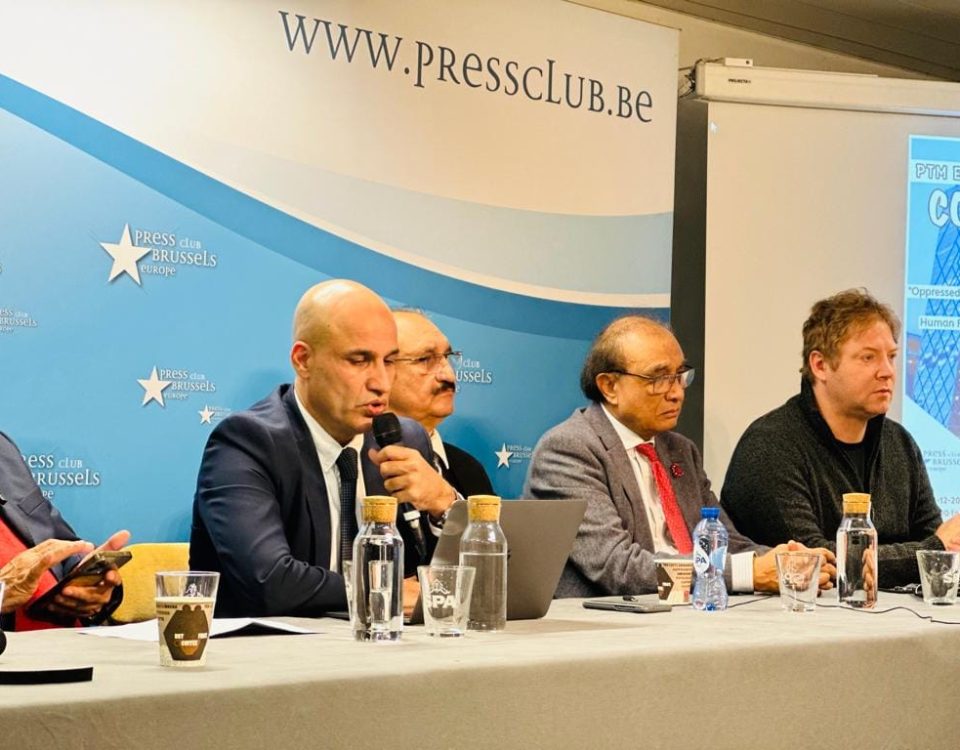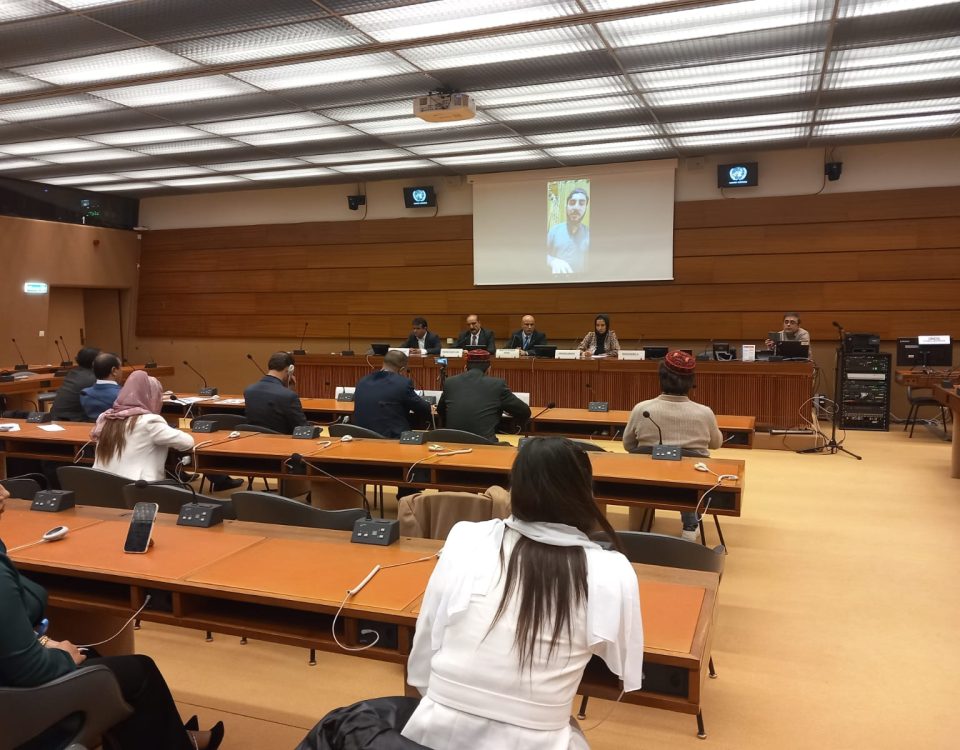- Have any questions?
- [email protected]
Dr. Eyal Be’eri talks to Afghan Refugees in Switzerland
November 13, 2021Freedom of Expression in Pakistan- Fazal ur Rehman AFRIDI
November 13, 2021Any act of Enforced Disappearances is an offence to Human Dignity; states the UN Declaration on protection of all persons from enforced disappearances.
There is no denying the fact that Balochistan is a land of Enforced Disappearances. Extrajudicial killings, arbitrary detentions, and torture have all occurred as a result of the valiant Baloch people’s long struggle for freedom and liberty. But, most importantly, the Pakistan Army has forcibly disappeared thousands of Balochs with impunity. The Pakistani courts have not held anyone responsible for these atrocities, human rights abuses, and crimes against humanity.
No one could have predicted that even Pashtuns would be victims of Pakistan Army’s inhumane practice/crime just a few years ago. It was owing to the emergence of a movement known as PTM, which used active lobbying to convince the international community and institutions such as the United Nations that Pashtuns are not terrorists but victims of terrorism.
According to PTM, the so-called war on terrorism has resulted in death of around 75000 innocent Pashtuns, disappearance of 32000, and displacement of 2.5 million Pashtuns. The missing people are being held in 44 known and undisclosed Internment Centers across Pakistan, where they are being humiliated and tormented. Majority of them are dealing with psychological and mental issues. Recently released missing folks have been diagnosed with psychological issues. Most of the missing people, according to independent observers, have been slain and put in mass graves.
In March 2011, Pakistan established a Commission of Enquiry on Enforced Disappearances to investigate the issue of mission personnel disappearances. However, it appears that it was also a trick to deceive the Pakistani people. According to the Commission’s findings, 4804 cases of missing persons were investigated, 3274 of which were treated, and 1710 of which are still pending. Pashtuns make up the majority of those who have gone missing. It’s important to notice that the 3274 instances do not imply that these people have been released or brought before the courts, but rather that they have been discovered.
The head of this commission Justice Javed Iqbal, reported to a parliamentary Committee of the National Assembly of Pakistan that more than 4000 persons have been sold by President Musharaf Regime to foreign countries to earn dollars. This statement un-mask the lies and deceits of Pakistani Institutions including Judiciary.
How can such egregious breaches of human rights occur in a society that purports to be civilised and where the rule of law and supremacy of the constitution reign supreme? The aforementioned commission failed to put responsibility on persons and organisations. It also did not file cases against persons who were directly or indirectly responsible for disappearances.
In this context, we have communicated with various UN Human Rights Council working groups and submitted examples of enforced disappearances, extrajudicial killings, and arbitrary detentions to special procedures. The UN Human Rights Council’s special working committees have effectively expressed our issues to Pakistan’s government. In this regard, we produced a list of around 4000 missing Pashtuns, which included 150 cases of forcible disappearances involving special processes. Several letters have been sent to Pakistani state in response to the enforced disappearances of Pashtuns. All the cases discussed above have been communicated by us through an INTERNATIONAL ADVOCACY COMMITTEE OF PTM. I had the honour to meet the members of the Working Group on Involuntary and Enforced Disappearances (WGIED) through a ZOOM conference on September 22, 2020 to discuss ways and means to document the cases and informed the group about the threats, intimidations and harassments by the government of Pakistan to our activists on the ground who collect information on disappearances.
Our main achievement because our documentations and submission of the cases was realized when UN raised the issue of controversial ordinance named Action in Aid of Civil Power, mainly responsible for these disappearances.
On December 30, 2019, 3 working groups including Working Group on Enforced or Involuntary Disappearances; Special Rapporteur on the promotion and protection of human rights and fundamental freedoms while countering terrorism and Special Rapporteur on torture and other cruel, inhuman or degrading treatment or punishment, pursuant to Human Rights Council resolutions 36/6, 40/16 and 34/19, sent a letter/communication No- OL PAK 10/2019 raised serious concerns about the Khyber Pakhtunkhwa Actions (In Aid of Civil Power) Ordinance 2019, issued by the provincial governor on 5 August 2019, which assigns wide-ranging powers to the armed forces. On 17 October 2019, the Ordinance was declared unconstitutional by the Peshawar High Court (PHC). However, the decision was overturned on 25 October 2019 by the Supreme Court in Islamabad. It is reportedly almost a reproduction of regulations implemented in 2011 in the former Federally Administered Tribal Areas (FATA) and Provincially Administered Tribal Areas (PATA), yet now extends to the entire province.
The working groups expressed serious concerns about the vague and overly broad detention provisions which grant armed forces sweeping powers to arrest and to indefinitely hold in “internment centres”, which are not formally within the prison system. Any individual suspected of having committed prohibited acts or “having nexus” with such acts, on the basis of mere suspicion, without charge, trial or any form of judicial oversight. The Ordinance provides wide immunity for armed forces and empowers the army under Article 245 of the Constitution, which means that its actions cannot be challenged in any court. It can be misused against political activists, human rights defenders and individuals exercising their constitutionally protected rights to freedoms of assembly, expression and association.
United Nations Declaration on the Protection of All Persons from Enforced Disappearances, which sets out the necessary protections with respect to the responsibility of the State; in particular that no State shall practice, permit or tolerate enforced dis-appearances (Article 2), that any person deprived of liberty shall be held in an officially recognized place of detention (Article 10.1), and that an official up-to date register of all persons deprived of their liberty shall be maintained in every place of detention (Article 10.3).
The working group stated in clear terms that Under international law, States have obligations and duties to respect, protect and fulfil human rights and fundamental freedoms. Even during an emergency — no matter how it is occasioned
Keeping in mind the extent and the scale of matter, I think all the oppressed nations in Pakistan need to co-ordinate their efforts and take the cases of enforced disappearances to the international community and important international institutions like United Nations collectively to force Pakistan to stop this crime against humanity.
So, we demand a Truth and Reconciliation Commission under the UN to investigate the human rights violations committed by the Pakistan Army in the former FATA.
About the author:
Fazal Ur Rehman Afridi is currently the President of Paris based Think Tank, Khyber Institute for Research and Strategic Studies. He is also a Writer, Journalist and Human Rights Activist.



